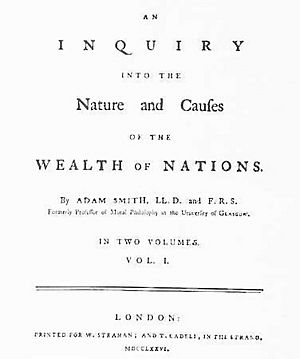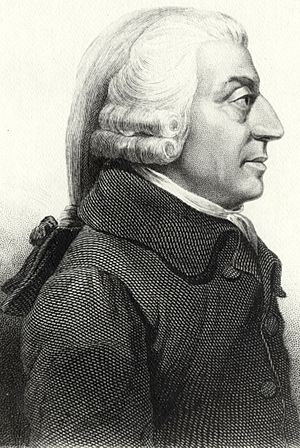Classical economics facts for kids
Classical economics is the first big way of thinking about how countries create wealth and how people make choices about money. It started a long time ago, around the 1700s. Some of the most important thinkers who developed these ideas were Adam Smith, Jean-Baptiste Say, David Ricardo, Thomas Malthus, and John Stuart Mill. They helped us understand how economies work.
Adam Smith and The Wealth of Nations
Adam Smith's famous book, The Wealth of Nations, was published in 1776. This book was the real start of classical economics. Smith believed that if everyone worked to do what was best for themselves, it would actually help society as a whole.
Before Smith, people often thought a country's wealth was just how much gold or treasure the king had. But Smith said that what truly matters is the yearly income of the whole nation. He wanted to figure out how a country could become richer and how people could help that growth. Smith's book explained that land, labor (work), and capital (money and tools) were the three main things that helped a nation become wealthy. These are sometimes called the "factors of production."
Smith also explained how prices naturally change based on how much of something there is and how much people want it. This is called supply and demand. If there's a lot of something (high supply), its price usually goes down. This makes more people want to buy it. If many people want something but there isn't much of it (high demand and scarcity), then the price will go up. People will compete to buy it, and some will pay more to get what they want.
Smith thought that markets should be free. Back then, some big companies, like the East India Company, were controlled by the government. Sometimes, rulers made rules that helped themselves but hurt workers or customers. For example, in the American colonies, people could grow cotton. But they were not allowed to make clothes from it. They had to send the cotton to England to be made into clothing. Then, they had to buy it back after it was finished.
Smith said this was bad for everyone. He believed it was better for money and goods to move freely between buyers and sellers. He thought that money would naturally go to the sellers who made the best products at the best prices. Smith famously said that if people acted in their own best interest, it would lead to the best outcome for society. It would be almost as if an "invisible hand" was guiding everything to work out well.
See also
 In Spanish: Economía clásica para niños
In Spanish: Economía clásica para niños
 | Sharif Bey |
 | Hale Woodruff |
 | Richmond Barthé |
 | Purvis Young |



